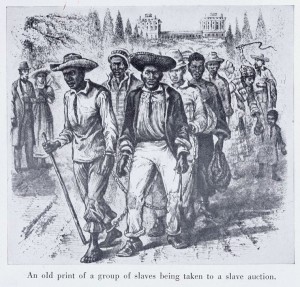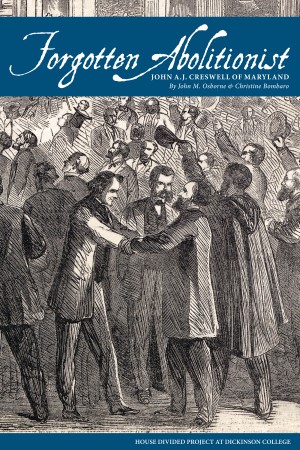 In September 1841, Abraham Lincoln encountered a group of chained slaves (called a “coffle”) from Kentucky being taken down the Ohio River on a steamboat –victims of the domestic slave trade. The sight affected Lincoln deeply, although he described its impact in quite different ways in two letters separated by more than a decade. Lincoln’s correspondents, Mary and Joshua Speed, were siblings, and Joshua Speed was Lincoln’s closest friend.
In September 1841, Abraham Lincoln encountered a group of chained slaves (called a “coffle”) from Kentucky being taken down the Ohio River on a steamboat –victims of the domestic slave trade. The sight affected Lincoln deeply, although he described its impact in quite different ways in two letters separated by more than a decade. Lincoln’s correspondents, Mary and Joshua Speed, were siblings, and Joshua Speed was Lincoln’s closest friend.
Abraham Lincoln to Mary Speed, September 27, 1841
“By the way, a fine example was presented on board the boat for contemplating the effect of condition upon human happiness. A gentleman had purchased twelve negroes in different parts of Kentucky and was taking them to a farm in the South. They were chained six and six together. A small iron clevis was around the left wrist of each, and this fastened to the main chain by a shorter one at a convenient distance from, the others; so that the negroes were strung together precisely like so many fish upon a trot-line. In this condition they were being separated forever from the scenes of their childhood, their friends, their fathers and mothers, and brothers and sisters, and many of them, from their wives and children, and going into perpetual slavery where the lash of the master is proverbially more ruthless and unrelenting than any other where; and yet amid all these distressing circumstances, as we would think them, they were the most cheerful and apparantly happy creatures on board. One, whose offence for which he had been sold was an over-fondness for his wife, played the fiddle almost continually; and the others danced, sung, cracked jokes, and played various games with cards from day to day. How true it is that “God tempers the wind to the shorn lamb,” or in other words, that He renders the worst of human conditions tolerable, while He permits the best, to be nothing better than tolerable.”
Abraham Lincoln to Joshua Speed, August 24, 1855
“You suggest that in political action now, you and I would differ. I suppose we would; not quite as much, however, as you may think. You know I dislike slavery; and you fully admit the abstract wrong of it. So far there is no cause of difference. But you say that sooner than yield your legal right to the slave—especially at the bidding of those who are not themselves interested, you would see the Union dissolved. I am not aware that any one is bidding you to yield that right; very certainly I am not. I leave that matter entirely to yourself. I also acknowledge your rights and my obligations, under the constitution, in regard to your slaves. I confess I hate to see the poor creatures hunted down, and caught, and carried back to their stripes, and unrewarded toils; but I bite my lip and keep quiet. In 1841 you and I had together a tedious low-water trip, on a Steam Boat from Louisville to St. Louis. You may remember, as I well do, that from Louisville to the mouth of the Ohio there were, on board, ten or a dozen slaves, shackled together with irons. That sight was a continual torment to me; and I see something like it every time I touch the Ohio, or any other slave-border. It is hardly fair for you to assume, that I have no interest in a thing which has, and continually exercises, the power of making me miserable. You ought rather to appreciate how much the great body of the Northern people do crucify their feelings, in order to maintain their loyalty to the constitution and the Union.”
Study Question
Historian Eric Foner calls the first letter (to Mary Speed), “oddly dispassionate” and suggests that Lincoln had to grow a great deal before he discovered the “violation of rights” illustrated by the scene of the chained slaves (see Foner, The Fiery Trial (2010), pp. 11-12). Do you agree? Does this exchange primarily illustrate Lincoln’s growth on the question of slavery’s evil?

